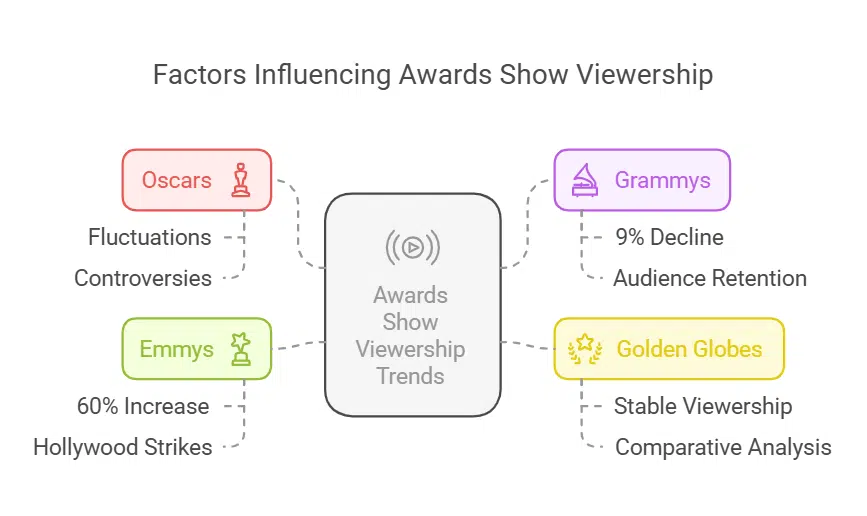The 97th Academy Awards garnered significant attention on Sunday, March 2, 2025, at the Dolby Theatre in Los Angeles as Hollywood’s biggest night celebrated the best in cinema. Despite a strong lineup of nominees and several historic wins, the viewership numbers saw a decline compared to previous years.
According to Disney, earlier, the Oscars drew 18.07 million viewers across ABC and Hulu, marking a 7% drop from 2024’s 19.5 million. But a latest update from Disney suggests that the 97th Oscars delivered a five-year high in both total viewers (19.69 million) and adults 18-49 (4.54 rating), driven by mobile and PC viewing by younger viewers.
Oscars Viewership Details in 2025
The Oscars had 19.69 million viewers this year, the highest in five years. This was a big success for ABC and primetime TV. More young viewers helped increase the ratings.
The show was more popular than in past years, beating other primetime programs like American Idol. Nielsen reported strong numbers, even with some technical issues.
These record-breaking numbers show that people are excited about the Oscars again and love its star-studded charm. The 97th Oscars earned 104.2 million total social interactions, ranking as the No. 1 most social TV program season-to-date, outperforming both “The Grammy Awards” (102.2 million interactions) and “The Super Bowl” (62.4 million) this season for the first time on record.
To know more about how Oscar achieves a 5-year high in total viewership record, follow here.
Technical Glitches on Hulu’s Live Stream
One of the major issues on the night of the ceremony was technical difficulties experienced by Hulu users. For the first time, the Academy Awards were streamed live on Hulu in addition to ABC, but the experience was marred by widespread issues.
Reports surfaced that some users were unable to log in at the start of the show, while others were abruptly kicked out of the stream before the final awards were announced. The timing of these glitches, especially during the crucial Best Picture and acting categories, led to frustration among viewers and raised concerns about Hulu’s ability to handle large-scale live events.
Ceremony Duration: A Factor in Viewer Drop-Off?
This year’s Oscars telecast ran for 3 hours and 47 minutes, making it one of the longer ceremonies in recent years. While it wasn’t the longest in history—several past editions have exceeded four hours—the extended runtime may have contributed to audience fatigue.
However, the Academy made a strategic decision to start the ceremony earlier at 7 p.m. ET/4 p.m. PT, ensuring that the broadcast remained largely within primetime viewing hours. This move likely helped retain some of the audience who might have tuned out in previous years when the show stretched past 11 p.m. ET.
Award Show Viewership Trends: A New Normal?
The Oscars are not the only awards show experiencing fluctuations in viewership. The Grammys saw a 9% decline in ratings this year, while the Golden Globes remained largely flat compared to 2024.
The Emmys, however, experienced a dramatic 60% increase in viewership, though this was largely due to the fact that the 2023 ceremony had been delayed for several months due to the dual Hollywood strikes. This suggests that while awards shows continue to struggle with audience retention, certain factors—such as controversy, scheduling changes, and cultural relevance—can significantly impact numbers.
Historic Wins and Notable Achievements
Despite the ratings decline, the night was filled with memorable moments, particularly for filmmaker Sean Baker, who made history by winning four Oscars in one night for the same film. His drama Anora dominated the evening, winning Best Picture, Best Director, Best Editing, and Best Original Screenplay.
This achievement tied Walt Disney’s long-standing record for the most Oscars won by a single individual in one ceremony, a feat last accomplished in 1954.
In the acting categories, Mikey Madison secured the Best Actress award for her performance in Anora, while Adrien Brody won Best Actor for The Brutalist, marking his second Oscar win 22 years after his first for The Pianist. Zoe Saldaña took home Best Supporting Actress for her role in Emilia Pérez, and Kieran Culkin won Best Supporting Actor for his performance in A Real Pain, a victory that had been widely anticipated throughout the awards season.
Conan O’Brien’s Hosting and Ceremony Highlights
Hosting duties were taken on by late-night television host Conan O’Brien, who brought a blend of humor and lightheartedness to the show. Unlike some previous years, the ceremony avoided heavy political statements, focusing instead on celebrating the films and talent in attendance.
Notable moments included heartfelt tributes to industry icons Gene Hackman and Quincy Jones, both of whom received honorary recognition for their contributions to cinema. Additionally, musical performances from Ariana Grande and Cynthia Erivo captivated the audience, adding to the night’s entertainment value.
The Future of Oscars Broadcasting: Will Streaming Take Over?
With traditional television viewership in decline, the Academy is reportedly exploring new broadcasting options for future ceremonies. Discussions are underway about potential partnerships with streaming giants like Netflix and Amazon Prime, which could open up new opportunities to expand global reach and cater to changing audience habits.
While ABC remains the primary broadcaster for now, the challenges faced by Hulu this year underscore the need for improved streaming infrastructure if the Oscars are to fully embrace digital platforms.
As the film industry evolves, so too must the Academy Awards. While the 2025 ceremony may not have matched last year’s peak in viewership, it still delivered a night of celebration, history-making wins, and strong audience engagement in key demographics.
Moving forward, the Academy will need to balance tradition with innovation, ensuring that the Oscars remain a relevant and must-watch event in the ever-changing landscape of entertainment consumption.









































